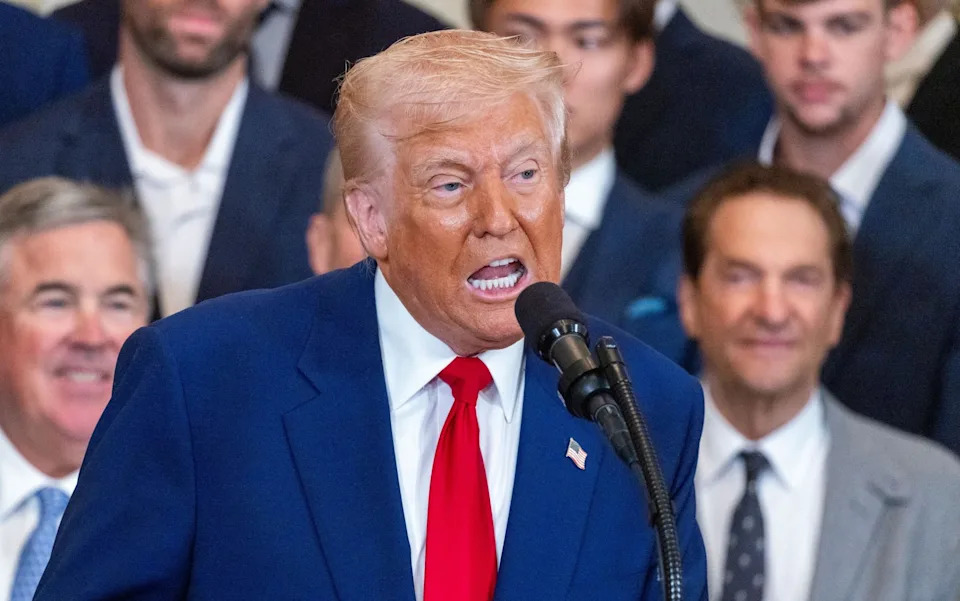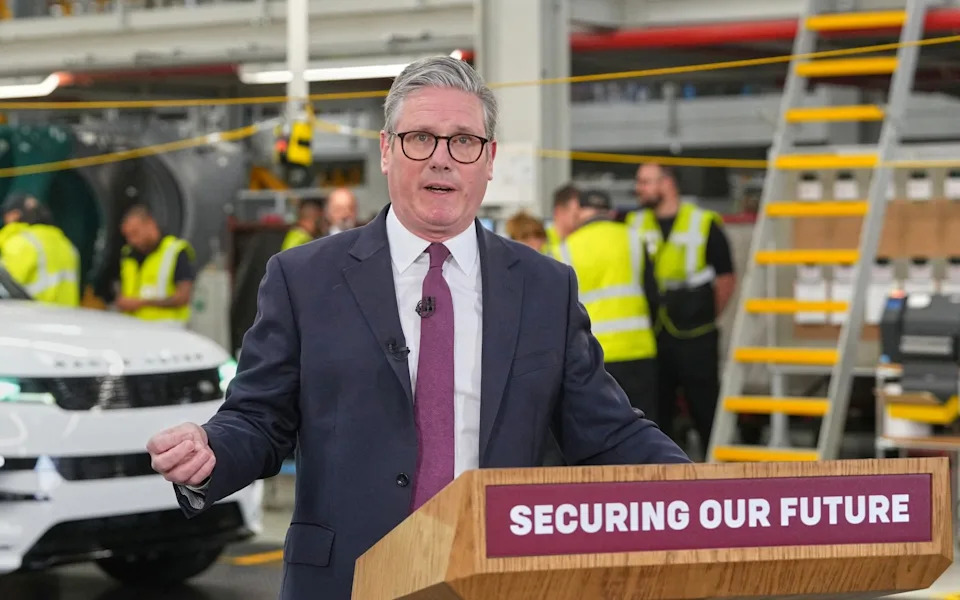
Donald Trump has urged Americans not to panic despite trillions of dollars being wiped from global markets by his tariff onslaught.
In an apparent reference to his own Republican Party, the US president told critics not to be “a Panican” – coining a new phrase which he described as “a new party based on weak and stupid people”.
China was threatened with additional 50pc import tariffs on Monday as Mr Trump remained defiant despite warnings the US was probably already in recession.
A wild day of trading saw the S&P 500, which tracks the share price of America’s biggest firms, briefly enter a bear market, marking a 20pc drop from its recent highs just two months ago.
Roughly $10 trillion has now been wiped off global stock markets since April 2 when Mr Trump announced sweeping import taxes of up to 50pc on “liberation day”.
Writing on Truth Social, Mr Trump said: “The United States has a chance to do something that should have been done DECADES AGO. Don’t be Weak! Don’t be Stupid! Don’t be a PANICAN (A new party based on Weak and Stupid people!).
“Be Strong, Courageous, and Patient, and GREATNESS will be the result!”
Global stock markets extended their losses on Monday, with the FTSE 100 ending the day down 4.6pc, taking its loss since Mr Trump’s Rose Garden tariff announcement to 11pc, its biggest three-session drop since lockdown in March 2020.
Stock markets in Italy, Spain and France posted similar losses, while US stocks gyrated wildly, falling by as much as 4.7pc as rumours of a tariff reprieve were quickly dashed.
Larry Fink, the chief executive of BlackRock, the world’s largest money manager overseeing £11.6 trillion in assets, warned that another 20pc decline in global stocks was possible.
Mr Fink added there was “zero” chance of the US Federal Reserve slashing rates four times this year to save the economy as financial markets are betting.
“The economy is weakening as we speak,” he said in an interview with Bloomberg. “Most CEOs I talk to would say we are probably in recession right now.”
Goldman Sachs believes there is now a 45pc chance the world’s biggest economy will suffer a downturn this year, the second time in a week it has slashed the odds of recession.
Stocks briefly surged amid reports on social media that Mr Trump was pondering a 90-day pause on tariffs on all economies except China.
However, they sank again as it quickly became apparent that remarks attributed to Kevin Hassett, the head of the president’s economic council, were false.
Karoline Leavitt, White House press secretary, flatly denied the reports. “It’s fake news,” she told NBC.
An 8pc swing in the S&P 500 on a single day has only been seen during the pandemic, financial crisis and the dotcom bubble crash in the early 2000s. The stock market seesawing meant £2.5 trillion was added and then wiped off the S&P within the space of 15 minutes.
As pressure from the markets built, Mr Trump’s hardline economic adviser Peter Navarro hit back in an article published by The Financial Times.
He warned the tariffs were “just the beginning” and said the administration would turn its attention to the “barrage of non-tariff weapons foreign nations use to strangle American exports”.
Mr Trump has previously branded VAT “far more punitive” than tariffs, which he has accused the UK and EU of deploying.
Mr Trump won backing from billionaires as the country’s elites gathered round the Republican in the wake of his election victory in November. But there are signs he is losing support from corporate America.
Jamie Dimon, the chief executive and chairman of JP Morgan, warned tariffs would “likely increase inflation and are causing many to consider a greater probability of a recession”.
In his annual letter to shareholders, Mr Dimon said a fragmentation of the US’s economic alliances would mean that “America itself would inevitably weaken over time”.
Bill Ackman, the US hedge fund tycoon and former Democrat donor, called for a “time-out” before tariffs came into force , to avoid “destroying confidence in our country as a trading partner”.
The trade war means “business investment will grind to a halt, consumers will close their wallets and pocket books, and we will severely damage our reputation with the rest of the world that will take years and potentially decades to rehabilitate”, Mr Ackman said.
Meanwhile, Sir Keir Starmer suggested he wanted to “seize the opportunity” for a trade deal.

“Nobody welcomes tariffs, we don’t want to get into a trade war. Obviously we will continue to talk to the US about a deal to alleviate the situation whilst keeping all options on the table,” the Prime Minister said.
“We can’t be cowed and simply say there are things happening in a changing world which make it more difficult and therefore we retreat. This is the moment to seize the opportunity.”
In a sign that British policymakers will play a key role in ensuring global tensions do not escalate into a financial crisis, Andrew Bailey, Governor of the Bank of England, was chosen as the next head of the world’s financial stability watchdog.
His appointment as chairman of the Financial Stability Board comes at a critical time for the global economy. “It is at times like this that the stability of the financial system is put to the test,” said Mr Bailey.
Ursula von der Leyen, president of the European Commission, said she would offer Mr Trump a deal to eliminate tariffs on both sides of the Atlantic, in the face of the new 20pc levies which the US is applying to imports from the EU.
“We have offered zero-for-zero tariffs for industrial goods, as we have successfully done with many other trading partners, because Europe is always ready for a good deal,” she said. “But we are also prepared to respond through counter-measures and defend our interests.”
The EU is drawing up a list of American products which it will tax more heavily.
However, the US president has already hit back, threatening punitive taxes on European alcohol if Brussels goes ahead with extra levies on American bourbon.
The EU indicated it hoped to avoid triggering a tit-for-tax war over the trade in drinks, after lobbying from major producer nations including France and Ireland.
Mr Trump threatened to hit imports from China with an additional 50pc import tax unless Beijing withdrew its 34pc retaliatory tariff.
This would be in addition to a range of previous tariffs, leaving US companies facing a tax of at least 104pc on goods imported from China.
However, Beijing stressed it would not bow to American threats, ahead of Mr Trump’s warning over plans to further ramp up tariffs on imports from the world’s second-largest economy.
Lin Jian, at China’s Ministry of Foreign Affairs, said: “Pressure and threats are not the way to deal with China. China will firmly safeguard its legitimate rights and interests.”
In a sign that Mr Trump remains unfazed by the stock market ructions, the New York Times reported that he spent the end of last week hosting a dinner at his Mar-a-Lago resort, where guests paid $1m a head to dine with the president at his private club.
On Monday afternoon, it was reported that Mr Trump was preparing to veto a bill introduced by cross-party senators that would limit his authority to impose tariffs.
The White House believes the bill, which is backed by seven Republican senators, would “dangerously hamper the president’s authority and duty to determine our foreign policy and protect our national security”, Axios said.
Broaden your horizons with award-winning British journalism. Try The Telegraph free for 1 month with unlimited access to our award-winning website, exclusive app, money-saving offers and more.


